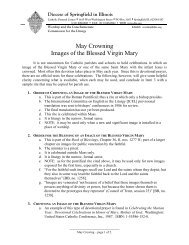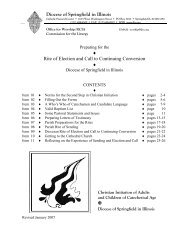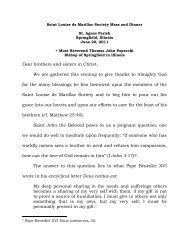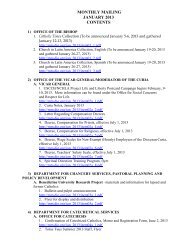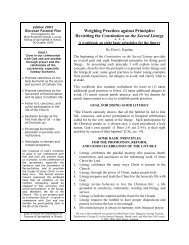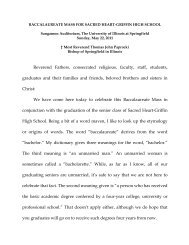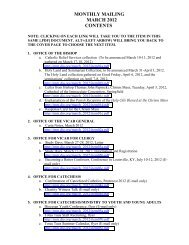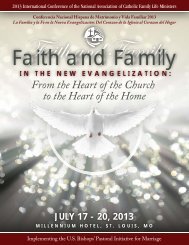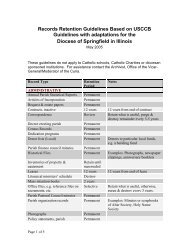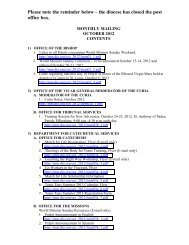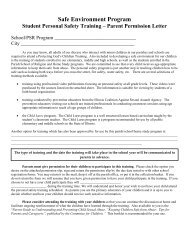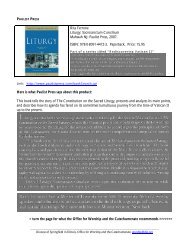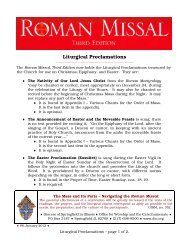Fortnight For Freedom - Diocese of Springfield in Illinois
Fortnight For Freedom - Diocese of Springfield in Illinois
Fortnight For Freedom - Diocese of Springfield in Illinois
You also want an ePaper? Increase the reach of your titles
YUMPU automatically turns print PDFs into web optimized ePapers that Google loves.
Day 4 June 24, 2013Reflections for theFORTNIGHT FOR FREEDOMThese reflections and read<strong>in</strong>gs from the Vatican II document Declaration on Religious Liberty (Dignitatis Humanae) are <strong>in</strong>tendedfor daily use dur<strong>in</strong>g the <strong><strong>For</strong>tnight</strong> for <strong>Freedom</strong>, a national campaign designated by the U.S. Catholic bishops for teach<strong>in</strong>g and witness<strong>in</strong> support <strong>of</strong> religious liberty. The read<strong>in</strong>gs and the questions that follow can be used for group discussion or for personal reflection.On his part, man perceives and acknowledgesthe imperatives <strong>of</strong> the div<strong>in</strong>e law through the mediation<strong>of</strong> conscience. In all his activity a man is bound t<strong>of</strong>ollow his conscience faithfully, <strong>in</strong> order that he maycome to God, for whom he was created. It followsthat he is not to be forced to act <strong>in</strong> a manner contraryto his conscience. Nor, on the other hand, is he to berestra<strong>in</strong>ed from act<strong>in</strong>g <strong>in</strong> accordance with his conscience,especially <strong>in</strong> matters religious.<strong>For</strong>, <strong>of</strong> its very nature, the exercise <strong>of</strong> religionconsists before all else <strong>in</strong> those <strong>in</strong>ternal, voluntary, andfree acts whereby man sets the course <strong>of</strong> life directlytoward God. No merely human power can either commandor prohibit acts <strong>of</strong> this k<strong>in</strong>d.However, the social nature <strong>of</strong> man itself requiresthat he should give external expression to his <strong>in</strong>ternalacts <strong>of</strong> religion; that he should participate with others<strong>in</strong> matters religious; that he should pr<strong>of</strong>ess his religion<strong>in</strong> community. Injury, therefore, is done to the humanperson and to the very order established by God forhuman life, if the free exercise <strong>of</strong> religion is denied <strong>in</strong>society when the just requirements <strong>of</strong> public order donot so require.accordance with his or her conscience. This is especiallythe case when it <strong>in</strong>volves one’s religious beliefs.The Council Fathers note that this applies not onlyto one’s <strong>in</strong>ternal private religious acts but also topublic communal religious acts. Human be<strong>in</strong>gs holdreligious beliefs with<strong>in</strong> a community <strong>of</strong> like-m<strong>in</strong>dedbelievers and so have the right to publicly live outtheir beliefs. To forbid the just and proper publicexpressions <strong>of</strong> religious belief would be contrary to theorder that God has established for human be<strong>in</strong>gs associal and religious be<strong>in</strong>gs.The Council Fathers want to ensure that religiousliberty is understood to be both private and public. Itcannot be limited to what takes places <strong>in</strong> houses <strong>of</strong>worship. Rather, s<strong>in</strong>ce religion is by its nature a socialphenomenon, its presence with<strong>in</strong> the broader societyand culture should not be h<strong>in</strong>dered or forbidden.In what ways is religion be<strong>in</strong>g reduced to themerely personal and private? Why should religionhave a voice <strong>in</strong> the public square?Declaration on Religious Liberty(Dignitatis Humanae), no. 3December 7, 1965Reflection for Day FourIt is through their consciences that human be<strong>in</strong>gsperceive the requirements <strong>of</strong> the div<strong>in</strong>e law. Humanbe<strong>in</strong>gs must follow faithfully their conscience if theyare to grow <strong>in</strong> their knowledge <strong>of</strong> and union withGod. Aga<strong>in</strong>, the Council restates that, because <strong>of</strong>this, no one should either be forced to act contraryto his or her conscience or be forbidden to act <strong>in</strong>Excerpts from The Documents <strong>of</strong> Vatican II, Walter M. Abbott,SJ, General Editor, copyright © 1966 by America Press, Inc.Repr<strong>in</strong>ted with permission. All rights reserved. Copyright ©2012, United States Conference <strong>of</strong> Catholic Bishops, Wash<strong>in</strong>gton,DC. All rights reserved.



